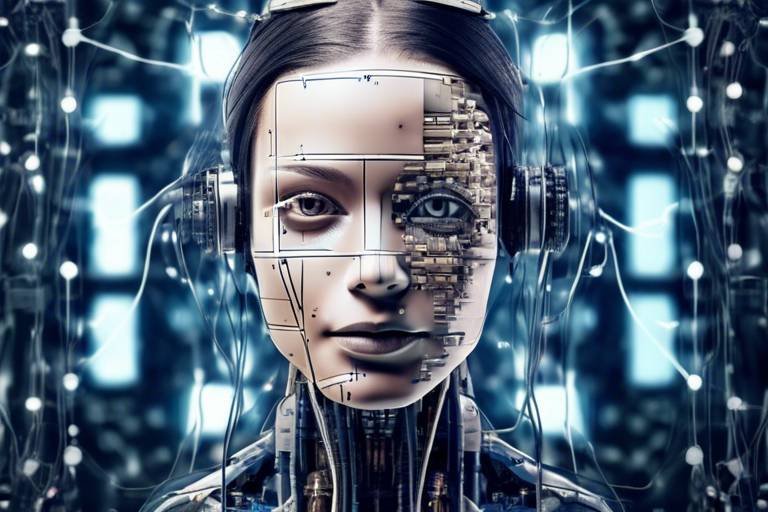Debunking Misconceptions About AI Ethics
In today's rapidly evolving technological landscape, artificial intelligence (AI) is becoming an integral part of our daily lives. However, with its rise comes a flurry of misconceptions surrounding AI ethics. Many people often view AI ethics as a niche topic, confined to developers and tech enthusiasts. In reality, it encompasses a much broader spectrum of issues that affect everyone in society. Understanding these misconceptions is crucial for fostering a more informed dialogue about the ethical implications of AI technologies.
One of the most pervasive myths is that AI ethics is merely a technical issue. While it does involve technical considerations, such as algorithm design and data handling, it also delves into moral philosophy and the societal impacts of these technologies. For instance, when we think about AI systems making decisions—be it in hiring, law enforcement, or healthcare—we must recognize that these decisions can have profound effects on individuals and communities. Thus, AI ethics extends far beyond the programming realm and into the core of our societal values.
Another common misconception is that only developers are responsible for ethical AI. This belief overlooks the fact that ethical considerations must involve a diverse array of stakeholders. From policymakers and ethicists to affected communities, the conversation around AI ethics needs to be inclusive. Everyone has a role to play in ensuring that AI technologies are developed and deployed in ways that respect human rights and promote social justice.
Moreover, many people think that ethical AI development is simply about following a set of coding practices or guidelines. While these practices are important, they are just the tip of the iceberg. Ethical AI development requires a comprehensive understanding of the societal context in which these technologies operate. This means considering the potential consequences of AI applications throughout the entire development lifecycle, from inception to deployment and beyond. It's akin to planting a tree; you must consider not only the seed but also the soil, sunlight, and water it will need to thrive.
Collaboration across various fields is essential for effectively addressing the ethical dilemmas posed by AI. It’s not just about tech; it’s about weaving together insights from technology, law, sociology, and philosophy. This interdisciplinary approach allows us to tackle the complex questions that arise when AI intersects with human lives. For example, how do we balance innovation with privacy rights? How do we ensure that AI systems do not perpetuate existing biases? These questions require a collaborative effort to find solutions that are both ethical and practical.
As we continue to integrate AI into our daily lives, we must remain vigilant about its impacts on society. AI technologies can significantly influence social structures, raising ethical questions about bias, privacy, and decision-making. To responsibly deploy AI, we need to understand these impacts and actively engage in discussions about how to mitigate potential harms. After all, technology should serve humanity, not the other way around.
In conclusion, debunking misconceptions about AI ethics is vital for fostering a more informed and responsible conversation about the future of technology. By recognizing that AI ethics extends beyond technical issues and involves a wide range of stakeholders, we can pave the way for a future where AI technologies are developed with fairness, accountability, and transparency at their core.
- What is AI ethics?
AI ethics refers to the moral implications and responsibilities associated with creating and using artificial intelligence technologies, focusing on fairness, accountability, and societal impact. - Why is interdisciplinary collaboration important in AI ethics?
It allows for a comprehensive understanding of the ethical dilemmas posed by AI, combining insights from various fields to address complex issues effectively. - Who is responsible for AI ethics?
AI ethics involves multiple stakeholders, including developers, policymakers, ethicists, and affected communities, all of whom play a role in ensuring ethical AI practices. - How can bias in AI be mitigated?
By employing ethical data collection practices and ensuring algorithmic transparency, we can identify and reduce biases in AI systems.

Understanding AI Ethics
When we dive into the world of AI ethics, we're really talking about the moral compass that guides the creation and use of artificial intelligence technologies. It's not just about writing code or developing algorithms; it's about understanding the profound implications these technologies have on society. Imagine AI as a powerful tool—like a double-edged sword—that can either uplift humanity or pose significant risks if not handled wisely. So, what does it mean to navigate the ethical landscape of AI?
At its core, AI ethics revolves around several key principles that help us assess the impact of AI on individuals and communities. These principles include fairness, accountability, and transparency. Fairness ensures that AI systems do not perpetuate existing biases or create new forms of discrimination. Accountability holds developers and organizations responsible for the outcomes of their AI technologies, while transparency allows users to understand how decisions are made by these systems. Without these guiding principles, we risk creating a future where AI exacerbates social inequalities rather than alleviating them.
Furthermore, the societal impact of AI cannot be overstated. From healthcare to education, AI technologies are reshaping our lives in ways we often don't fully comprehend. For instance, consider how AI is used in hiring practices. If an AI system is trained on biased data, it may unfairly favor certain candidates over others, leading to a lack of diversity in the workplace. This is where the ethical implications become crucial. We need to ask ourselves: Are we comfortable with machines making decisions that could affect lives?
In essence, understanding AI ethics means recognizing that these technologies are not just tools, but entities that interact with our social fabric. It's about fostering a dialogue that includes various stakeholders—developers, ethicists, policymakers, and the communities affected by AI. By doing so, we can create a more inclusive approach to AI development, ensuring that the voices of those impacted are heard and considered. This collaborative effort is essential in addressing the ethical dilemmas that arise as AI continues to evolve.

Common Misconceptions
When it comes to AI ethics, there are numerous misconceptions that cloud our understanding of this vital topic. Many people mistakenly believe that AI ethics is solely a technical issue, confined to the realm of developers and engineers. This is far from the truth! In reality, AI ethics is a multifaceted field that impacts everyone in society, from policymakers to everyday users. Just like how a ship needs a crew to navigate through stormy seas, AI requires a diverse set of stakeholders to steer its ethical journey.
One common misconception is that ethical considerations only arise during the development phase of AI technologies. People often think, "Well, if the developers are doing their job right, then we don’t need to worry about ethics later." However, this couldn't be more misleading. Ethical implications can emerge at any stage of the AI lifecycle, from the initial data collection to the deployment of the final product. It’s akin to planting a seed; if you don't consider the soil and environment, the plant may not grow as intended.
Moreover, many assume that only the developers are responsible for ethical AI practices. This notion not only oversimplifies the issue but also ignores the essential input from various groups, including ethicists, sociologists, and the communities affected by AI technologies. For instance, when an AI system makes decisions that impact people's lives—like hiring or loan approvals—it’s crucial to involve those who will be affected by these decisions. Think of it as a dinner party: you wouldn’t just invite the chef and ignore the guests' dietary restrictions!
Another misconception is the belief that AI systems are inherently objective. In reality, these systems can perpetuate existing biases found in the data they are trained on. If the data reflects societal inequalities, the AI will likely replicate those biases in its outcomes. This highlights the importance of ethical data collection practices. To combat this, we must ensure that our datasets are diverse and representative of all segments of society. By doing so, we can create algorithms that are not only effective but also fair.
Lastly, some people think that transparency in AI is merely a technical requirement. They believe that as long as the algorithms function correctly, the ethical concerns are addressed. However, the truth is that transparency is about more than just how an algorithm works; it’s about building trust with users and stakeholders. When people understand how decisions are made, they are more likely to trust the technology. It’s like reading the ingredients on a food label—knowing what’s in your food helps you make informed decisions about what to consume.
In summary, the misconceptions surrounding AI ethics can lead to a dangerous oversimplification of a complex issue. By recognizing that AI ethics is a collective responsibility that transcends technical boundaries, we can better navigate the ethical waters of artificial intelligence. After all, the future of AI should not just be about innovation; it should also prioritize human values and societal welfare.

The Role of Developers
The role of developers in the realm of AI ethics is often misunderstood. Many people think that developers are the only players in this complex game, but that couldn't be further from the truth. While they are indeed the architects of AI systems, their responsibilities extend beyond just writing code. Developers must be aware of the ethical implications of their work, considering how their algorithms will affect real people in the real world.
Imagine a chef preparing a meal. The chef not only needs to know how to cook but also must understand the dietary needs and preferences of their diners. Similarly, developers must grasp the societal context in which their AI systems operate. They need to engage with various stakeholders, including ethicists, policymakers, and community members, to ensure that their creations are beneficial and fair.
Furthermore, ethical AI development is a collaborative endeavor. Developers should be open to feedback and insights from diverse fields such as sociology, law, and philosophy. This interdisciplinary approach is crucial for addressing the multifaceted ethical dilemmas that arise from AI technologies. For instance, a developer might create a facial recognition system, but without input from sociologists studying racial bias, the system could inadvertently perpetuate existing inequalities.
To illustrate the importance of collaboration, consider the following table that highlights the various stakeholders involved in ethical AI development:
| Stakeholder | Role |
|---|---|
| Developers | Create and implement AI systems |
| Ethicists | Provide moral frameworks and guidelines |
| Policymakers | Regulate and govern AI technologies |
| Affected Communities | Offer insights into the societal impact of AI |
In conclusion, developers are not just code writers; they are pivotal players in a larger ethical landscape. Their role requires them to be proactive, seeking out diverse perspectives and integrating ethical considerations into every stage of the AI development process. By doing so, they can help create technologies that not only push the boundaries of innovation but also uphold the values of fairness and accountability.

Ethics Beyond Coding
When we think about artificial intelligence, it's easy to get caught up in the technical aspects—lines of code, algorithms, and machine learning models. But here's the kicker: ethics in AI goes far beyond just coding. It’s like building a house; sure, the bricks and mortar are essential, but if you don’t consider the neighborhood, the environment, and the people living in it, your beautiful structure could end up being a disaster waiting to happen.
To truly grasp the ethical dimensions of AI, we need to step back and look at the bigger picture. This means understanding how these technologies fit into our lives and the potential consequences they bring. For instance, have you ever thought about how an AI that decides who gets a loan might reflect biases present in the data it was trained on? These biases can perpetuate inequality, and that’s where ethics comes into play. It’s about ensuring that as we innovate, we also protect the values that matter to society.
Moreover, ethical AI development involves a proactive approach. It’s not enough to just fix problems as they arise; we need to integrate ethical considerations from the very beginning of the development lifecycle. This means:
- Engaging with stakeholders: This includes not just developers but also users, ethicists, and community representatives who can provide valuable insights into the potential impacts of AI technologies.
- Conducting impact assessments: Before deploying AI systems, it’s crucial to evaluate their potential effects on different demographics and societal structures.
- Creating ethical guidelines: Establishing a framework for ethical AI development helps ensure that all team members are aligned on core values and responsibilities.
In essence, integrating ethics into AI development is about creating a culture of responsibility. It requires a shift in mindset, where developers and organizations see themselves as part of a larger ecosystem that includes the communities their technologies will affect. This collaborative approach can lead to more innovative solutions that not only advance technology but also uphold human dignity and promote fairness.
As we move forward, the conversation around AI ethics must continue to evolve. It’s not just a checkbox to tick off; it’s a fundamental aspect of creating technology that serves humanity. So, are we ready to take on this challenge? The future of AI depends on our willingness to embrace ethics as a core principle, guiding every decision we make in this exciting yet complex field.
- What is AI ethics? AI ethics refers to the moral principles and guidelines that govern the development and use of artificial intelligence technologies, focusing on fairness, accountability, and societal impact.
- Why is ethics important in AI? Ethics is crucial in AI to prevent biased outcomes, protect user privacy, and ensure that AI technologies are developed responsibly and transparently.
- Who is responsible for AI ethics? While developers play a significant role, responsibility for AI ethics extends to policymakers, ethicists, and the community, requiring a collaborative approach.
- How can we mitigate bias in AI? Mitigating bias involves ethical data collection practices, diverse datasets, and transparency in algorithmic decision-making processes.

Collaboration Across Fields
In the rapidly evolving landscape of artificial intelligence, the need for collaboration across various fields has never been more critical. When we talk about AI ethics, we can't simply confine the conversation to the realm of computer science or programming. It’s a multifaceted issue that requires insights from a diverse array of disciplines. Think of it as a symphony, where different instruments come together to create a harmonious piece of music. Each discipline—be it technology, law, sociology, or philosophy—brings its unique perspective and expertise, enriching the overall understanding of AI ethics.
For instance, consider the role of sociologists. They can provide invaluable insights into how AI technologies affect different communities and social structures. By analyzing societal impacts, they can help identify potential ethical dilemmas that may arise from AI deployment. Similarly, legal experts can contribute by ensuring that AI systems comply with existing laws and regulations, while also advocating for new laws that address emerging ethical issues. This collaboration is not just beneficial; it's essential for creating robust ethical frameworks that guide the development and deployment of AI technologies.
Moreover, ethical considerations must be integrated throughout the entire lifecycle of AI development. This means that collaboration should begin at the inception of a project and continue through its deployment and beyond. By fostering an environment where different fields intersect, we can ensure that ethical considerations are not an afterthought but rather a foundational element of AI development. The goal is to build AI systems that are not only effective but also fair, transparent, and accountable.
To illustrate how interdisciplinary collaboration works in practice, let's look at a few key areas where different fields converge:
| Field | Contribution |
|---|---|
| Technology | Develops the algorithms and systems |
| Law | Ensures compliance with regulations and advocates for new laws |
| Sociology | Analyzes social impacts and community needs |
| Philosophy | Provides ethical frameworks and moral reasoning |
As we move forward, the importance of fostering these collaborative efforts cannot be overstated. By breaking down silos and encouraging open dialogue among different disciplines, we can tackle the complex ethical challenges posed by AI. This collaborative approach not only enhances our understanding of AI ethics but also leads to more informed decision-making, ultimately benefiting society as a whole.
- What is AI ethics? AI ethics refers to the moral implications and responsibilities involved in creating and using artificial intelligence technologies.
- Why is collaboration important in AI ethics? Collaboration across fields enriches the understanding of AI ethics and helps address complex ethical dilemmas more effectively.
- Who should be involved in discussions about AI ethics? It should involve a diverse group including developers, policymakers, ethicists, and affected communities.
- How can bias be reduced in AI systems? By ensuring diverse and representative datasets and promoting transparency in algorithmic processes.

Impacts on Society
The rise of artificial intelligence (AI) technologies is not just a technical revolution; it's a societal transformation that touches every aspect of our lives. From the way we communicate to the jobs we hold, AI is reshaping our social fabric in profound ways. One of the most significant impacts of AI lies in its ability to influence social structures, raising critical ethical questions that demand our attention. Have you ever wondered how the algorithms that dictate your social media feed might be impacting your worldview? Or how AI-driven hiring tools could affect your career opportunities? These are just a few examples of how AI's reach extends far beyond the confines of code and servers.
As AI systems become more integrated into our daily routines, the ethical implications of their decisions become increasingly important. For instance, consider the role of AI in law enforcement. Predictive policing algorithms can potentially lead to biased outcomes, disproportionately affecting marginalized communities. This is not just a technical issue; it’s a societal one that raises questions about fairness and justice. Similarly, in healthcare, AI tools can assist in diagnosing diseases, but if these systems are trained on biased data, they may provide unequal treatment recommendations based on race or socioeconomic status. Understanding these impacts is essential for responsible AI deployment.
Moreover, the decision-making processes influenced by AI can sometimes lack transparency, making it difficult for individuals to understand how decisions that affect their lives are made. This opacity can lead to a lack of trust in AI systems and the organizations that deploy them. To illustrate this point, let’s look at a few key areas where AI is making a significant impact:
- Employment: AI is automating jobs, which can lead to job displacement but also creates new roles in tech and AI management.
- Privacy: With the rise of AI surveillance, concerns about personal privacy are more pressing than ever.
- Healthcare: AI can improve patient outcomes but may also introduce biases that affect treatment quality.
As we navigate this new landscape, it’s crucial to engage in ongoing discussions about the ethical implications of AI. Policymakers, technologists, and community members must collaborate to ensure that AI technologies serve the greater good, prioritizing human values and societal welfare. The future of AI ethics isn't just about preventing harm; it's about creating systems that empower individuals and promote equity across all sectors of society. In this rapidly evolving field, the question isn’t merely whether AI can do something, but rather, should it?
As we delve deeper into the impacts of AI on society, it’s natural to have questions. Here are some frequently asked questions to help clarify common concerns:
- What are the main ethical concerns associated with AI?
AI raises issues of bias, privacy, accountability, and the potential for job displacement. - How can we ensure AI technologies are used responsibly?
By promoting transparency, involving diverse stakeholders, and adhering to ethical guidelines. - What role do developers play in AI ethics?
While developers are crucial, ethical AI requires input from policymakers, ethicists, and communities affected by AI systems.

Addressing Bias in AI
Bias in artificial intelligence (AI) systems is a pressing concern that can lead to unfair outcomes and exacerbate existing inequalities. As we increasingly rely on AI for decision-making in various sectors such as finance, healthcare, and law enforcement, it becomes crucial to recognize and tackle these biases head-on. The implications of unchecked bias can be profound, affecting individuals' lives and the trust society places in technology. So, how do we go about addressing this critical issue?
First and foremost, it is essential to understand that bias often originates from the data used to train AI systems. If the data reflects historical prejudices or lacks diversity, the AI will likely reproduce those biases. Therefore, ethical data collection practices are foundational to reducing bias in AI. This means ensuring that the datasets used are not only diverse but also representative of all segments of society. For example, if an AI system is being trained to recognize faces, it should include a wide range of ethnicities, ages, and genders to avoid skewed results.
Moreover, it’s not just about collecting diverse data; it’s also about how that data is processed. Algorithmic transparency plays a crucial role in this context. When stakeholders can see how AI systems make decisions, it fosters trust and enables accountability. If an algorithm is opaque, it becomes challenging to identify where biases may be creeping in. To promote transparency, developers should document the decision-making processes of their algorithms and provide clear explanations of how data influences outcomes.
To illustrate the importance of addressing bias, consider the following table that highlights common sources of bias in AI systems and potential mitigation strategies:
| Source of Bias | Description | Mitigation Strategy |
|---|---|---|
| Data Bias | Data that is unrepresentative or reflects historical inequalities. | Use diverse and representative datasets. |
| Algorithmic Bias | Bias introduced during the algorithm design and training process. | Regularly evaluate algorithms for fairness and adjust as necessary. |
| Feedback Loop Bias | Bias that emerges when AI systems reinforce existing biases through feedback. | Monitor and correct biases in real-time to prevent reinforcement. |
Addressing bias in AI is not merely a technical challenge; it requires a holistic approach that involves various stakeholders. Collaboration between developers, ethicists, policymakers, and affected communities is essential to create AI systems that are fair and equitable. By incorporating diverse perspectives, we can better understand the societal implications of AI and design systems that prioritize fairness.
In conclusion, the journey to address bias in AI is ongoing and complex. It demands vigilance, commitment, and a willingness to engage in difficult conversations. As we continue to develop and deploy AI technologies, let’s strive to create systems that reflect our shared values and promote social justice. Only then can we harness the full potential of AI while ensuring that it serves everyone fairly.
Q1: What is AI bias?
A1: AI bias refers to the systematic and unfair discrimination that can occur when AI systems make decisions based on flawed or unrepresentative data.
Q2: How can we identify bias in AI systems?
A2: Bias can be identified through rigorous testing and evaluation of AI systems, including analyzing outcomes for different demographic groups.
Q3: Why is transparency important in AI?
A3: Transparency helps stakeholders understand how AI systems operate, which fosters trust and accountability, making it easier to identify and address biases.
Q4: Who is responsible for addressing bias in AI?
A4: Addressing bias is a shared responsibility among developers, policymakers, ethicists, and the communities affected by AI technologies.

Data Collection Practices
When we talk about in the realm of artificial intelligence, it's like laying the foundation of a house. If the foundation is shaky, the entire structure is at risk. Ethical data collection is not just a technical requirement; it is a moral obligation that ensures fairness and inclusivity in AI systems. Imagine trying to build a model to predict housing prices but only using data from affluent neighborhoods. The resulting algorithm would be skewed and unfair, perpetuating existing inequalities. This is why we must focus on collecting diverse and representative datasets that reflect the true tapestry of society.
To achieve this, organizations must adopt a comprehensive approach to data collection that includes:
- Diversity: Ensure that data encompasses various demographics, including age, gender, ethnicity, and socio-economic status. This diversity is crucial for creating algorithms that cater to all segments of society.
- Transparency: Organizations should be transparent about where their data comes from and how it is collected. This builds trust with users and stakeholders, ensuring that everyone understands the data's origins.
- Consent: Obtaining informed consent from individuals whose data is being collected is vital. People should know how their data will be used and have the right to opt-out.
Moreover, ethical data collection practices should be proactive rather than reactive. This means anticipating potential biases and addressing them before they become embedded in the AI systems. For instance, if an AI model is being trained to recognize faces, developers must ensure that the training dataset includes a wide range of ethnicities to avoid biased outcomes. It's about creating a level playing field where every individual is represented fairly.
In addition to diversity and transparency, organizations should implement rigorous auditing processes to evaluate their data collection methods continuously. This involves regularly revisiting the datasets used and assessing their relevance and accuracy. By doing so, organizations can adapt to changing societal norms and values, ensuring that their AI systems remain ethical and responsible.
Ultimately, ethical data collection practices are the bedrock upon which fair AI systems are built. By prioritizing diversity, transparency, and accountability, we can mitigate the risks of bias and discrimination, paving the way for a future where AI technologies serve everyone equitably.
- What is the importance of diverse data in AI? Diverse data is crucial because it helps ensure that AI systems are fair and do not perpetuate existing biases in society.
- How can organizations ensure ethical data collection? Organizations can ensure ethical data collection by being transparent, obtaining informed consent, and continuously auditing their data practices.
- What are the consequences of biased data in AI? Biased data can lead to unfair outcomes, reinforcing stereotypes and potentially causing harm to marginalized groups.
- Is consent necessary for data collection? Yes, obtaining informed consent is a fundamental aspect of ethical data collection, allowing individuals to understand how their data will be used.

Algorithmic Transparency
In today's rapidly advancing technological landscape, the concept of has emerged as a critical aspect of ethical AI development. But what exactly does this mean? Essentially, algorithmic transparency refers to the clarity and openness with which AI systems operate. It’s about making the inner workings of algorithms understandable not just to developers, but also to the general public, stakeholders, and those affected by AI decisions. Imagine trying to navigate a maze without knowing its layout; that’s how users often feel when they encounter opaque AI systems.
One of the primary reasons for advocating for transparency in AI is to foster trust. When individuals know how decisions are made—whether it's a loan approval, a job application, or even a medical diagnosis—they are more likely to feel confident in the system. Transparency acts as a bridge between technology and users, allowing people to see the logic behind decisions rather than feeling like they're at the mercy of a black box. This is particularly important in scenarios where biased algorithms can lead to significant personal and societal consequences.
Moreover, transparency can enhance accountability. When stakeholders understand how algorithms function, it becomes easier to hold developers and organizations responsible for their actions. This accountability is crucial in addressing issues of bias and discrimination that can arise from flawed algorithms. For instance, if an AI system is used to predict recidivism rates and it disproportionately affects certain demographics, transparency allows affected individuals to question and challenge these outcomes.
To illustrate the importance of algorithmic transparency, consider the following table, which highlights key benefits:
| Benefit | Description |
|---|---|
| Trust Building | Users feel more secure knowing how decisions are made. |
| Accountability | Developers and organizations can be held responsible for their algorithms. |
| Bias Identification | Transparency helps in recognizing and mitigating biases in AI systems. |
| Public Engagement | Encourages dialogue between developers and the community, fostering collaboration. |
Furthermore, achieving algorithmic transparency isn't just about making the code open-source; it's about effective communication. Developers need to explain their algorithms in layman's terms, ensuring that non-technical stakeholders can grasp the implications of AI systems. This means using visual aids, examples, and even case studies to illustrate how algorithms work and their potential impact on society. The more accessible this information is, the more likely it is that communities will engage with the technology, leading to better outcomes.
In conclusion, algorithmic transparency is not merely a technical requirement; it is a fundamental ethical principle that should guide the development and deployment of AI technologies. By prioritizing transparency, we can create AI systems that are not only effective but also fair and just. As we navigate the complexities of AI ethics, let’s remember that transparency is the key to unlocking the full potential of artificial intelligence while safeguarding human values.
- What is algorithmic transparency? It refers to the clarity and openness of AI systems, allowing users to understand how decisions are made.
- Why is transparency important in AI? It builds trust, enhances accountability, and helps identify biases in algorithms.
- How can developers ensure transparency? By explaining algorithms in simple terms, using visual aids, and engaging with the community.
- What are the consequences of a lack of transparency? It can lead to mistrust, accountability issues, and the perpetuation of bias in AI systems.

The Future of AI Ethics
As we stand on the brink of a new era in technology, the conversation around AI ethics is more critical than ever. The rapid advancements in artificial intelligence are reshaping industries and influencing everyday life, making it imperative to address the ethical implications that accompany these changes. One of the most pressing questions is: how can we ensure that AI serves humanity positively and responsibly? The future of AI ethics will hinge on a few key principles that need our attention.
First and foremost, we must focus on human-centric design. This means that AI systems should be developed with the end-user in mind, prioritizing their needs, rights, and well-being. Imagine a world where AI not only enhances productivity but also respects individual privacy and promotes equality. To achieve this, stakeholders must engage in continuous dialogue, ensuring that diverse perspectives are included in the development process. This collaborative approach will help us identify potential ethical pitfalls before they become problematic.
Moreover, as AI technologies evolve, the regulatory landscape must keep pace. Governments and regulatory bodies need to establish guidelines that not only govern the use of AI but also promote ethical practices among developers and organizations. This can involve creating frameworks that require transparency in AI decision-making processes, allowing users to understand how outcomes are derived. The goal is to build trust between AI systems and their users, fostering an environment where ethical considerations are at the forefront.
Another crucial aspect of the future of AI ethics is the need for education and awareness. As AI becomes more integrated into society, it is essential that individuals understand how these technologies work and the implications they carry. Educational initiatives can empower people to engage critically with AI systems, asking the right questions and advocating for their rights. For instance, schools and universities should incorporate AI ethics into their curricula, preparing the next generation of developers, policymakers, and citizens to navigate this complex landscape.
Furthermore, addressing global disparities in AI access and implementation will be vital. As AI technologies proliferate, we must ensure that they do not exacerbate existing inequalities. This means actively working to include marginalized communities in the conversation and ensuring that AI systems are designed to be inclusive and representative. By doing so, we can harness the power of AI to uplift all segments of society rather than leaving anyone behind.
Lastly, the future of AI ethics will require ongoing research and adaptation. As new challenges and technologies emerge, our ethical frameworks must evolve accordingly. This means fostering a culture of innovation that prioritizes ethical considerations alongside technical advancements. By creating interdisciplinary research initiatives that bring together ethicists, technologists, and social scientists, we can better understand the implications of AI and develop strategies that promote ethical practices across the board.
In conclusion, the future of AI ethics is a shared responsibility that requires collaboration, education, and a commitment to human values. By prioritizing ethical considerations in AI development and deployment, we can shape a future where technology serves as a force for good, enhancing our lives while respecting our rights and dignity. The journey ahead may be challenging, but with collective effort, we can navigate the complexities of AI ethics and create a brighter future for all.
- What is AI ethics? AI ethics refers to the moral implications and responsibilities associated with the development and use of artificial intelligence technologies.
- Why is AI ethics important? AI ethics is crucial because it addresses potential biases, privacy concerns, and the broader societal impacts of AI technologies, ensuring they are used responsibly.
- Who is responsible for AI ethics? While developers play a significant role, responsibility for AI ethics extends to policymakers, ethicists, and affected communities, requiring a collaborative approach.
- How can we mitigate bias in AI? By ensuring diverse and representative data collection practices and promoting transparency in algorithmic decision-making, we can work towards reducing bias in AI systems.
Frequently Asked Questions
- What is AI ethics?
AI ethics refers to the moral principles and responsibilities involved in the development and use of artificial intelligence technologies. It emphasizes fairness, accountability, transparency, and the societal impact of AI.
- Why is AI ethics important?
AI ethics is crucial because AI technologies can significantly affect social structures and individual lives. Ethical considerations help ensure that AI systems are fair, accountable, and beneficial to society, preventing harm and bias.
- Who is responsible for AI ethics?
While developers play a key role in AI ethics, responsibility extends beyond them. It involves input from policymakers, ethicists, and communities affected by AI technologies, highlighting the need for diverse perspectives.
- How can bias in AI be addressed?
Bias in AI can be mitigated through ethical data collection practices and ensuring that datasets are diverse and representative. Additionally, transparency in algorithmic processes helps stakeholders understand and address potential biases.
- What does algorithmic transparency mean?
Algorithmic transparency means making the decision-making processes of AI systems clear and understandable. This fosters trust among users and enables accountability, ensuring that AI applications operate fairly.
- How can interdisciplinary collaboration improve AI ethics?
Interdisciplinary collaboration brings together insights from various fields like technology, law, sociology, and philosophy. This collective knowledge is essential for addressing complex ethical dilemmas and developing responsible AI practices.
- What are the future challenges for AI ethics?
As AI technologies evolve, ongoing discussions about ethics will be vital. Challenges include ensuring that human values and societal welfare are prioritized in AI development, as well as addressing emerging ethical dilemmas.



















